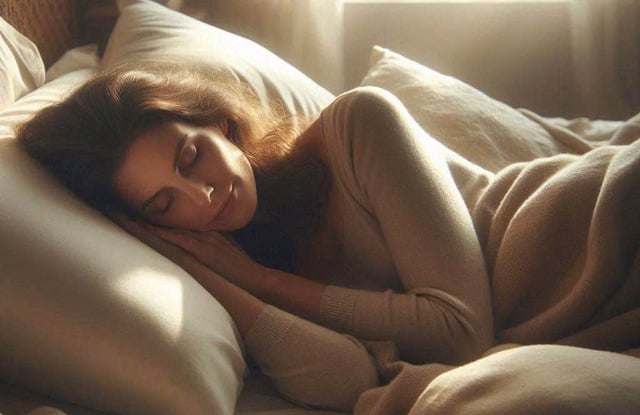Most people spend about a third of their lives sleeping, but you may need more or less than eight hours a night. The amount of sleep you need changes throughout your life.
Here's what scientists and doctors say about how many hours of sleep you need.

People aged 26 to 64 should sleep 7 to 9 hours.
Photo: AI
Quality over quantity!
Sleep remains a mystery, despite its importance to health.
Sleep is something we all do. It’s the most natural way we take care of ourselves, says Dr. Rafael Pelayo, a sleep physician at Stanford University.
Most people sleep between seven and nine hours, and this is the healthiest amount of sleep, said Dr. Molly Atwood, a sleep physician at Johns Hopkins School of Medicine (USA), according to the Hindustan Times.
Dr. Molly Atwood says that if you sleep less than six hours or more than nine hours, your risk of health problems increases, but it's different for everyone.
What matters is sleep quality, says Dr. Pelayo: What you really want is to wake up feeling refreshed, that’s the problem. If you’re getting plenty of sleep but still waking up feeling sleepy, something’s wrong, he says.
The amount of sleep needed varies throughout life.
Dr. Atwood said: Newborns need to sleep about 14 - 17 hours a day because at this stage they are growing rapidly and need more sleep.

Newborns need about 14 - 17 hours of sleep
Photo: AI
The National Sleep Foundation recommends that people aged 26 to 64 get 7 to 9 hours of sleep.
People aged 65 and over may need a little less sleep than this, and people aged 16 to 25 may need a little more.
People cycle through sleep stages about every 90 minutes. Early in the evening, you'll be mostly in slow-wave sleep, or deep sleep, which is essential for the body's repair and regeneration, says Dr. Atwood. This is also when the body releases "growth hormone."
During the early morning hours, the stage of rapid eye movement sleep or dream sleep is dominant, which is important for learning and memory consolidation.
Children sleep more deeply, with about 50% of their sleep being in deep sleep, but this drops off in adolescence, says Dr. Atwood. It's important to listen to your body.
When to see a doctor?
Feeling sleepy, irritable, irritable, and having trouble concentrating during the day could mean you're not getting enough sleep. Over time, these small symptoms can turn into serious problems.
Dr. Atwood warns: Insufficient sleep, insomnia or sleep apnea, if left untreated, can easily lead to depression. This in turn increases the risk of cardiovascular problems such as high blood pressure, heart attack and stroke. The immune system is weakened and the risk of Alzheimer's disease increases.
If you get the recommended amount of sleep each night but still wake up feeling sleepy, you may need to see a doctor, according to Hindustan Times.
Source: https://thanhnien.vn/ban-thuc-su-can-ngu-bao-nhieu-tieng-moi-dem-18525041421322158.htm
























![[Photo] General Secretary To Lam begins official visit to Russia and attends the 80th Anniversary of Victory over Fascism](https://vphoto.vietnam.vn/thumb/1200x675/vietnam/resource/IMAGE/2025/5/8/5d2566d7f67d4a1e9b88bc677831ec9d)

































































Comment (0)